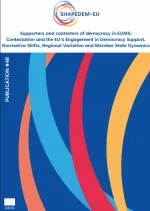Supporters and contesters of democracy in EUMS: Contestation and the EU’s Engagement in Democracy Support. Normative Shifts, Regional Variation and Member State Dynamics

SHARPEDEM-EU publication 48
The European Union (EU) has become one of the few actors in global affairs in the middle of the third decade of the 21st century, which continues to keep democracy support high on its agenda. In response to the growing geopolitical tensions in its neighbourhoods, however, the EU and its member states are revising the strategy of democracy support. In this working paper, we use contestation lenses and capture the EU’s changing role by analysing its criticism. By examining the contestation patterns of existing discourses and practices of democracy promotion in the EU member states (EUMS), this paper explores the role of contestation in shaping the EU’s engagement in democracy support (DS), with particular attention to how contestation manifests across different levels of EU norms and governance practices. Empirically, we mapped criticism as seen from the level of member states towards democracy support. We rely on thoroughly gathered and analysed data in the 2014– 2022 period from seven EUMS – Austria, Denmark, Germany, Italy, Poland, Spain and Sweden – within the SHAPEDEM-EU project. The documents on DS in the selected EUMS gathered in the 2011–2022 period were updated to include reactions until 2024 to developments in the EU neighbourhood following the Russian invasion of Ukraine and the prolonged Israeli war in Gaza following the Hamas attack of 7 October 2023.
The key findings demonstrate that the fundamental norm of liberal democracy is essentially uncontested by actors in EUMS. However, certain constitutive elements of the norm are subject to occasional contestation, mainly by some think tanks and parliamentary actors and through the repositioning of the DS as a secondary value to security. This suggests that there is a shift toward a more pragmatic approach; however, discursively, Normative Power Europe is still the dominant approach in the analysed material. Regarding the DS for both neighbourhoods, our analysis demonstrates that the logic of democracy promotion and support in the two EU neighbourhoods differs, with diverse patterns of contestation. It results in and reflects two distinct types of actor identities: normative- and pragmatic-focused. Both EU neighbourhoods are becoming spaces where geopolitical considerations weigh more, specifically because in both there are an increased security deterioration and destabilisation caused by the Russian aggression on Ukraine in the East and the Israeli prolonged war in Gaza. As a result, these have become increasingly less normative spaces.